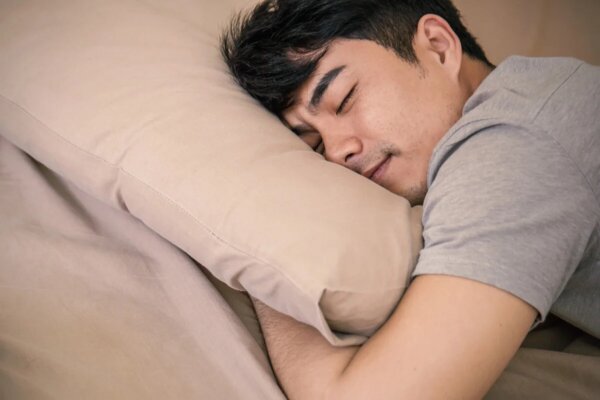Sexsomnia, a Very Unusual Sleep Disorder


Written and verified by the psychologist Valeria Sabater
Sexsomnia is a type of parasomnia where a person exhibits sexual behavior while they’re asleep. It’s a rare condition. In fact, the World Health Organization (WHO) suggests that there are few documented cases.
It can be problematic for the sufferer, as they can sometimes have sex with someone else without even knowing it. However, it should be noted that this condition has nothing to do with somnophilia, which is when someone prefers to have sex with unconscious people.
Currently, there are only 150 published cases of this disorder. However, experts consider that many more people could be suffering from it. In fact, they think that people are probably too embarrassed or maybe don’t even deem it necessary to seek medical help.

Definition, symptoms, and treatment of sexsomnia
The International Classification of Sleep Disorders (ICSD) classifies parasomnias in the group of REM sleep disturbances. This classification also includes nightmares, night terrors, sleep paralysis, confusional arousal, etc. Experts first described this disorder a few decades ago, in 1986.
This means that, to date, experts don’t know much about this condition. However, the Federal University of São Paulo has conducted some studies. Their researchers suggested that sexsomnia not only has clinical implications but can also have legal implications. This is because complicated situations can occur when a person has sex with others who haven’t consented.
Symptoms
The condition manifests itself in several ways. The most noteworthy is that it’s sometimes accompanied by the classic behavior of a sleepwalker. In other words, unconsciously getting out of bed, walking, and performing tasks. However, sufferers also demonstrate sexual behaviors in this disorder, including:
- Fondling their intimate parts or those of their partner.
- Masturbating.
- Pelvic thrusting.
- Groaning and sweating.
- Having sex with other people without being aware of it.
- Occasionally being violent.
- Being unresponsive to their environment.
- Speaking disjointed words and incoherent phrases.
- Not remembering anything about these episodes.
What causes sexsomnia?
Experts lack data on this condition. What they do know is that, as with other parasomnias, like sleepwalking, sexsomnia occurs due to a sleep cycle alteration. More particularly, changes in the REM sleep cycle. However, where does it originate from?
The following factors could lead to sexsomnia:
- States of anxiety.
- Working in shifts, as this affects sleep patterns.
- States of extreme exhaustion or sleep deprivation.
- Alcohol and drug use.
- We should note that sleepwalking usually has a genetic cause. Consequently, people might also inherit this disorder.
Sexsomnia isn’t caused by any kind of sexual deviation. It isn’t a psychiatric or psychological condition. Neither is it due to any trauma. In fact, it’s just another form of parasomnia.

Treatment for sexsomnia
The most striking thing about sexsomnia is that the sufferer is unaware of their condition. Thus, it can be rather disconcerting for the partner of the sufferer, as they might need to face situations they simply don’t know how to handle.
The most problematic effect is that the sufferer remembers nothing. This often causes disagreements. The sufferer won’t ever know about their nocturnal sexual behaviors unless a witness tells them.
There are a number of well-documented cases of these types of incidences. One example is that of Stephen Lee Davis, a British man who abused a teenage girl when she stayed in his home one night. The trial proved that he was suffering from sexsomnia and the jury found him not guilty. Peter Buchanan, a sleep disorder specialist, described another incidence. He treated a woman who would sleepwalk from her house to have sex with strangers.
Regarding treatment, it’s usually the same as the one used for cases of sleepwalking. Firstly, a doctor needs to assess the sufferer. In some cases, they might prescribe anxiolytics. In other cases, the individual might need to pay more attention to their sleep hygiene. Finally, they may need to put measures in place to avoid any uncomfortable risks and situations.
Sexsomnia is a type of parasomnia where a person exhibits sexual behavior while they’re asleep. It’s a rare condition. In fact, the World Health Organization (WHO) suggests that there are few documented cases.
It can be problematic for the sufferer, as they can sometimes have sex with someone else without even knowing it. However, it should be noted that this condition has nothing to do with somnophilia, which is when someone prefers to have sex with unconscious people.
Currently, there are only 150 published cases of this disorder. However, experts consider that many more people could be suffering from it. In fact, they think that people are probably too embarrassed or maybe don’t even deem it necessary to seek medical help.

Definition, symptoms, and treatment of sexsomnia
The International Classification of Sleep Disorders (ICSD) classifies parasomnias in the group of REM sleep disturbances. This classification also includes nightmares, night terrors, sleep paralysis, confusional arousal, etc. Experts first described this disorder a few decades ago, in 1986.
This means that, to date, experts don’t know much about this condition. However, the Federal University of São Paulo has conducted some studies. Their researchers suggested that sexsomnia not only has clinical implications but can also have legal implications. This is because complicated situations can occur when a person has sex with others who haven’t consented.
Symptoms
The condition manifests itself in several ways. The most noteworthy is that it’s sometimes accompanied by the classic behavior of a sleepwalker. In other words, unconsciously getting out of bed, walking, and performing tasks. However, sufferers also demonstrate sexual behaviors in this disorder, including:
- Fondling their intimate parts or those of their partner.
- Masturbating.
- Pelvic thrusting.
- Groaning and sweating.
- Having sex with other people without being aware of it.
- Occasionally being violent.
- Being unresponsive to their environment.
- Speaking disjointed words and incoherent phrases.
- Not remembering anything about these episodes.
What causes sexsomnia?
Experts lack data on this condition. What they do know is that, as with other parasomnias, like sleepwalking, sexsomnia occurs due to a sleep cycle alteration. More particularly, changes in the REM sleep cycle. However, where does it originate from?
The following factors could lead to sexsomnia:
- States of anxiety.
- Working in shifts, as this affects sleep patterns.
- States of extreme exhaustion or sleep deprivation.
- Alcohol and drug use.
- We should note that sleepwalking usually has a genetic cause. Consequently, people might also inherit this disorder.
Sexsomnia isn’t caused by any kind of sexual deviation. It isn’t a psychiatric or psychological condition. Neither is it due to any trauma. In fact, it’s just another form of parasomnia.

Treatment for sexsomnia
The most striking thing about sexsomnia is that the sufferer is unaware of their condition. Thus, it can be rather disconcerting for the partner of the sufferer, as they might need to face situations they simply don’t know how to handle.
The most problematic effect is that the sufferer remembers nothing. This often causes disagreements. The sufferer won’t ever know about their nocturnal sexual behaviors unless a witness tells them.
There are a number of well-documented cases of these types of incidences. One example is that of Stephen Lee Davis, a British man who abused a teenage girl when she stayed in his home one night. The trial proved that he was suffering from sexsomnia and the jury found him not guilty. Peter Buchanan, a sleep disorder specialist, described another incidence. He treated a woman who would sleepwalk from her house to have sex with strangers.
Regarding treatment, it’s usually the same as the one used for cases of sleepwalking. Firstly, a doctor needs to assess the sufferer. In some cases, they might prescribe anxiolytics. In other cases, the individual might need to pay more attention to their sleep hygiene. Finally, they may need to put measures in place to avoid any uncomfortable risks and situations.
All cited sources were thoroughly reviewed by our team to ensure their quality, reliability, currency, and validity. The bibliography of this article was considered reliable and of academic or scientific accuracy.
- Andersen ML, Poyares D, Alves RS, Skomro R, Tufik S. Sexsomnia: abnormal sexual behavior during sleep. Brain Res Rev. 2007 Dec;56(2):271-82. doi: 10.1016/j.brainresrev.2007.06.005. Epub 2007 Jul 13. PMID: 17706786.
- Ebrahim, Irshaad. (2006). Somnambulistic sexual behavior (sexomnia). Journal of clinical forensic medicine. 13. 219-24. 10.1016/j.jcfm.2006.02.001.
This text is provided for informational purposes only and does not replace consultation with a professional. If in doubt, consult your specialist.







